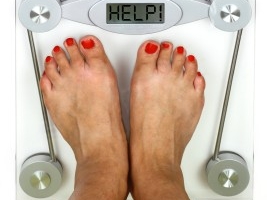Reading Time: 4 minutes
While once considered absurd, the idea that someone actually can be addicted to food is now a rather prevalent notion. Scientific evidence suggests that food addiction causes changes in the brain similar to the changes that result with various types of drug addiction, causing the reward system to actually respond to food and essentially shut down when food is not supplied. Food addiction symptoms, though not always easy to spot, are real and the more research that is done in the medical field, the more scientists are beginning to realize that food addiction really is no joke!
Recent studies on the way that the brain reacts to sugary substances have lead psychiatrists to believe that in some cases, for some people, certain foods cause a similar brain reaction to drugs such as cocaine and heroin. In fact, research from the US National Library of Medicine has shown that eating high-sugar or high-fat foods consistently can lead to cravings and a perceived “need” for such foods similar to the way a drug addict craves cocaine or needs heroin to feel good.
Here are some food addiction symptoms that you should be on the lookout for if you’re trying to figure out if you simply crave that candy bar or those waffle fries or if you truly are suffering from a deeper problem: an addiction to food.
1. Preoccupied with Food

You can overcome your food addiction symptoms!
If food is the only thing that’s on your mind there could be a bigger problem at hand. When food actually gets in the way of your life, creating interruptions with work, halting your social life or taking time away from your family then there is a problem. Becoming preoccupied with food, to the point that all you think about is food, eating or your next meal, is one of many food addiction symptoms that should not be overlooked.
2. You Love Food—Too Much
Food addiction symptoms aren’t always about how much you eat or what you eat. In fact, you may eat all the right foods but find that you simply cannot stop thinking about food or you cannot stop eating food. If you love food so much that you consistently find yourself eating even when you say you will eat less or stop eating certain foods, your behavior is out of control and there could be a much bigger problem that must be dealt with.
3. Eating Secretively or Lying About Food
Do you eat behind closed doors because you know that others disapprove of your eating habits? Have you lied to friends or loved ones about your eating in an effort to cover up your habitual food cravings? If you keep eating secret, lie about it or otherwise feel like you should hide your eating habits from those who love and care about you, there could be a problem with food addiction. Many food addiction symptoms, such as lying about what you eat or how much you ate, are similar to the symptoms of drug or alcohol addiction.
4. Eating Past the Point in Which You are Full
Do you eat so much that you feel like you’re going to pop? If you consistently eat more than you need to, essentially binging on food until you feel so full you could be sick, there’s a problem. Food addiction symptoms should not be considered on special days like Thanksgiving or your Birthday but if you make everyday a special day for the purpose of overeating, you may need to seek professional help for food addiction.
5. Eating for Pleasure
Emotional eating is a huge problem and one of the leading causes of obesity. For many centuries, meals have been a point of family gatherings and they have been used to build bonds, create pleasure and bring people together; it’s the American way. Unfortunately, regularly eating when you are not hungry or eating when you are depressed can lead to many problems including obesity and various other health concerns. Emotional eating is a sign that: a) you are addicted to food; or b) there is another problem such as depression or anxiety which requires professional help.
If you or someone you know is suffering from any of these potential food addiction symptoms, there could be an underlying eating disorder that requires professional help. Often times, eating disorders and food addiction are dually diagnosed. Treatment for one or the other won’t necessarily work as both problems must be treated equally in order to fend off the overall problem at hand.
Professional help is available for those who are addicted to food. Support groups such as Overeaters Anonymous or similar programs can also help by offering peer support for people who suffer from food addiction symptoms and are ready to get past their struggles with food and learn healthy eating habits that will work. Most importantly, food addiction does not have to be a constant struggle within one’s self to do well and to eat right.
